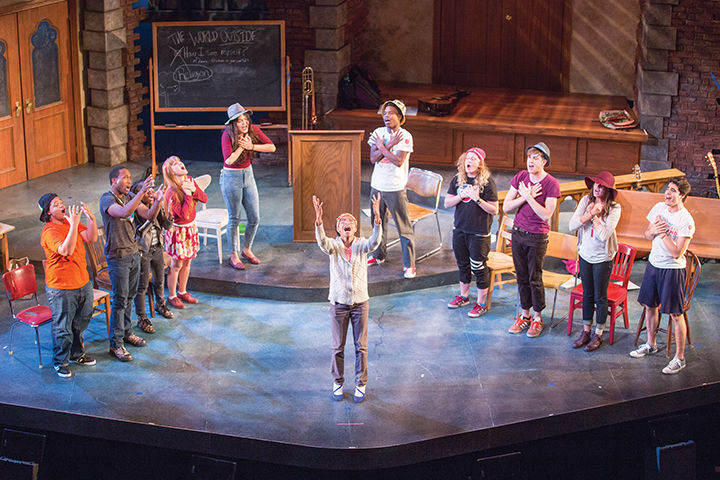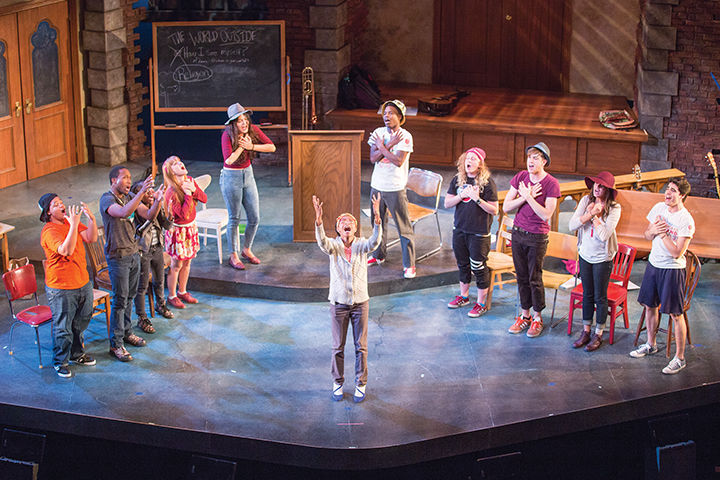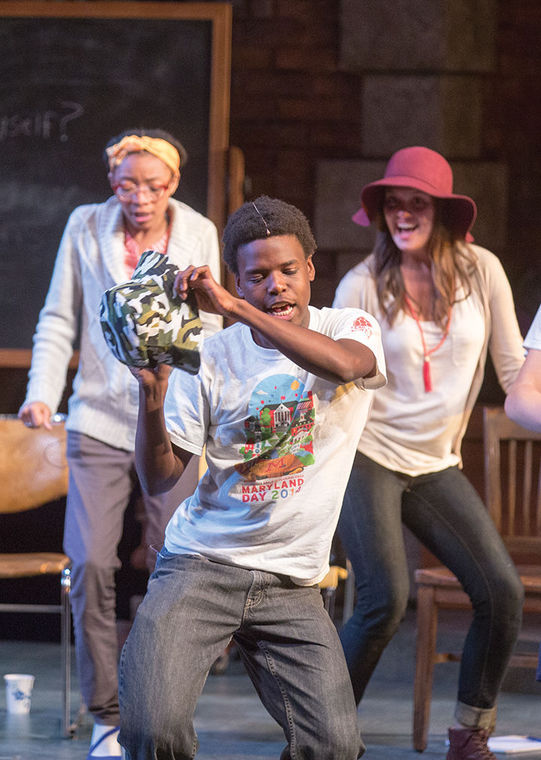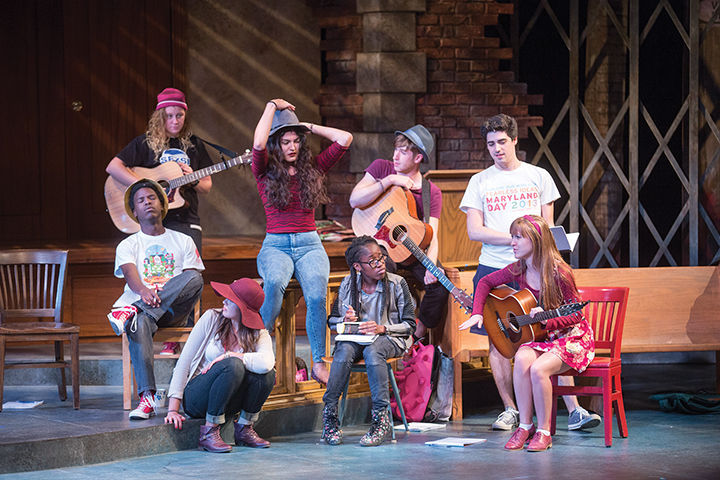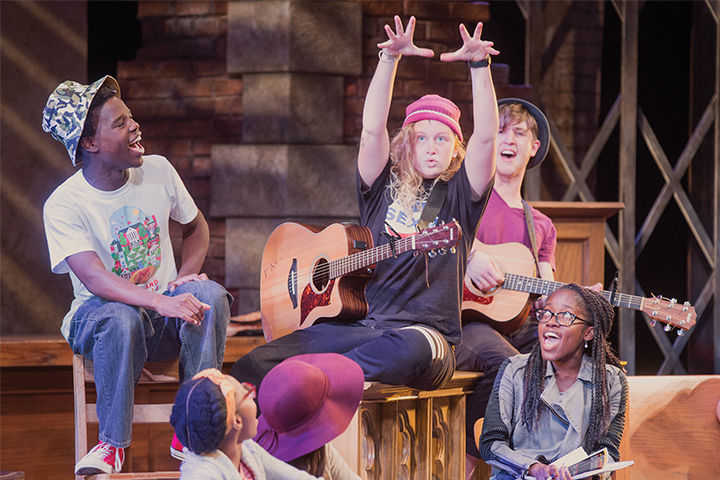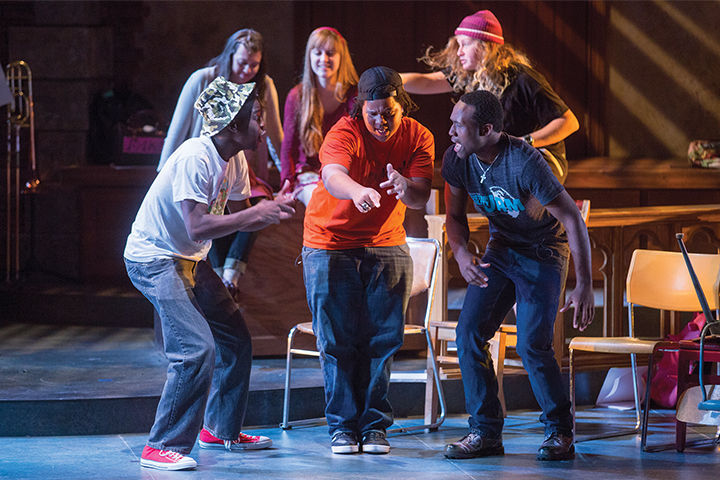Brown and orange leaves rattled with the brisk autumn wind just outside a conference room in the Clarice Smith Performing Arts Center. It was one of those sleepy fall days that strengthens the feeling that school is back — and with it, the work, stress and problems that come with being a young person in a confusing world.
The weather seemed fitting, as Alvin Mayes and Scot Reese, both faculty members of the theatre, dance and performance studies school, sat side by side by the window that shielded them from the elements outside. Mayes wore a Washington Capitals pullover, Reese, a simple sweater. The two talked about theater, stereotypes and how exactly we as a global community can sort through them.
The pair are the co-directors of this fall’s musical, The Me Nobody Knows, an unconventional play that deals with the very real hopes, fears and challenging social situations that 12 inner-city teens face.
After answering a few questions, Reese posed one of his own: “What do you think the play is about?”
***
It’s an interesting question.
About a week ago, the cast of The Me Nobody Knows gathered onstage in Kay Theatre, toting brightly colored backpacks and sporting a wide range of vibrant hats. Five minutes before the start of rehearsal, they began dancing, singing, yelling a song called “Numbers.” Out of context, it was disorienting; in context, it wasn’t much better.
“Prepare to be confused,” said Tendo Nsubuga, a junior theatre major who plays Benjamin, a 15-year-old boy who comes from an abusive home.
“When we first encountered the script, we didn’t know the meaning in between the lines,” Nsubuga continued. “Try your best to be open and find the meaning in between the lines.”

The Me Nobody Knows
As musicals go, The Me Nobody Knows is unconventional. It presents, all at once, a series of conversations between 12 kids who are struggling with racism, religion, addiction, sex, abuse and everything in between. The characters often alternate between speaking literally and metaphorically, moving among word, poem and song without warning. There are no jazz hands or kick lines or flashy dance numbers, and the plot isn’t like those of other musicals.
“It does have a plot in the sense that in the beginning of the play, you set up criteria, you set up problems, and then over the course of the play, they’re resolved as far as the community is concerned, and they’re resolved as far as the individual is concerned,” Mayes said.
Reese first approached Mayes about the play two years ago, but the two were already engaged in multiple projects. They decided last spring to pursue The Me Nobody Knows for this semester.
“We have a process for selection of plays for the season; we proposed it to the selection committee and they said ‘OK! It deals with the topics that we as a school want to address and be abreast of,’” Mayes said.
What are those topics? Empowerment. Openness. Fairness.
“Part of this is to get rid of stereotypes,” he continued. “Get rid of, ‘There’s a topic that you can’t talk about.’ Part of this environment, part of this play, is, how do we make a safe space?”
In order to create this forum, both Mayes and Reese thought of where a group of outcasts afraid of their problems — and the future — would go.
“We decided to create this space in the basement of a church. Maybe this is a place that’s used for a lot of different purposes,” Mayes said. “Maybe on Tuesday night it’s an AA meeting, maybe on Wednesday night it’s a meeting for …”
“Choir practice!” Reese finished.
The basement set is riddled with small glimpses into different worlds — an old bench forgotten after some church renovations, a basketball hoop maybe belonging to a recreational league, a chalkboard on which the gathered students track their conversations.
The space, though cluttered, reflects the wide array of deep issues that the characters unite to take on.

Me Nobody Knows
“We used that as part of the world that they live in,” Mayes said of the set.
***
When The Me Nobody Knows premiered in 1970, society was shaken up. Martin Luther King Jr. had been assassinated just two years prior. Race riots were exploding in the wake of the civil rights movement. The Kent State shootings rocked the idea of authoritative power. A broken education system left traumatized teens alone and disillusioned in the face of so much turmoil.
Today, not much has changed. Young people still deal with more stress than most give them credit for. Sex and drugs are still taboo; abuse is often covered up or shamed. The Me Nobody Knows is a place where all of this comes to light — and to a conclusion.
Each character is deeply introspective and in a way reflects the actors and actresses themselves. As part of the five-week preparation for the show, each cast member did research on the original writers and the characters in order to become as well-versed as the best dramaturge.
“They read the script; they came up with their own vision of the show; they think about what their character really thinks and what their real story is,” said Cindy King, a senior communication and theatre major and the play’s stage manager.
After presenting their findings, the cast and directors sat down to talk.
“[We would] have these wonderful, meaty conversations because there’s a lot of deep issues. This is not just a sing and dance and high school musical. These issues are huge,” said Reese.
Both Mayes and Reese gave the cast a lot of freedom to move, sing and act the way they thought their characters should. This play deals with an incredible amount of internal conflict and emotion; Mayes and Reese encouraged their students to let that come out through their bodily expression.
“It’s not very fun if we have to tell them what to do,” Reese said.
“We give them a sense of self,” added Mayes. “I want my neighbor to come to the show and understand what the show is — my neighbor is hard of hearing. They should still be able to get the gist of it, just by the physicality.”

Me Nobody Knows
There is no one main character in the show — each has a unique problem that holds a singular weight — and no one character is isolated from the others. The group of teens muddles through together.
Nsubuga hopes this openness between the characters and the cast translates to the audience.
“It’s important to realize that even though people might have major problems, like drug addiction or coming from abusive households, not to just give people some kind of label,” he said.
***
So, to answer the question Reese posed on that fall day a week ago, The Me Nobody Knows isn’t really about one thing. It’s about whatever you bring to it.

The Me Nobody Knows
In an attempt to understand, I asked Mayes if he would call the play a conversation. He responded that he would, but it’s a conversation with the idea of giving something back.
Each person comes from a distinct background. We’re not all the same religion or race; we don’t come from the same homes or lifestyles; not everyone wants the same things for the future or even the present — and that’s OK. The Me Nobody Knows reminds us that differences, failures, problems and demons are all OK to have if we’re willing to talk about them.
[ READ MORE: The Me Nobody Knows ]
Tendo Nsubuga sings a song at a rehearsal on stage for “The Me Nobody Knows” on Tuesday Sept. 30th. The show will debut on Friday Oct. 10 in the Kay Theater.
The cast of “The Me Nobody Knows” performs the show at a rehearsal on stage on Tuesday Sept. 30th. The show will debut on Friday Oct. 10 in the Kay Theater.
Chloe Adler and the cast of “The Me Nobody Knows” performs a scene at a rehearsal on stage on Tuesday Sept. 30th. The show will debut on Friday Oct. 10 in the Kay Theater.
Avery Collins (center) and the cast dance at a rehearsal on stage for “The Me Nobody Knows” on Tuesday Sept. 30th. The show will debut on Friday Oct. 10 in the Kay Theater.
